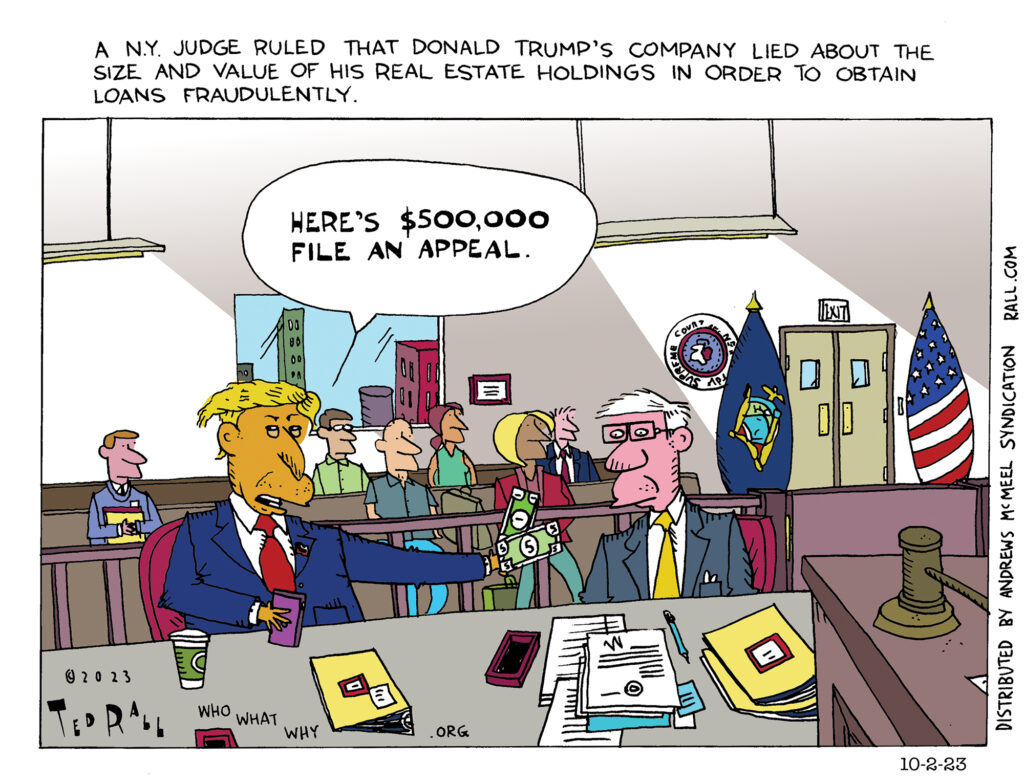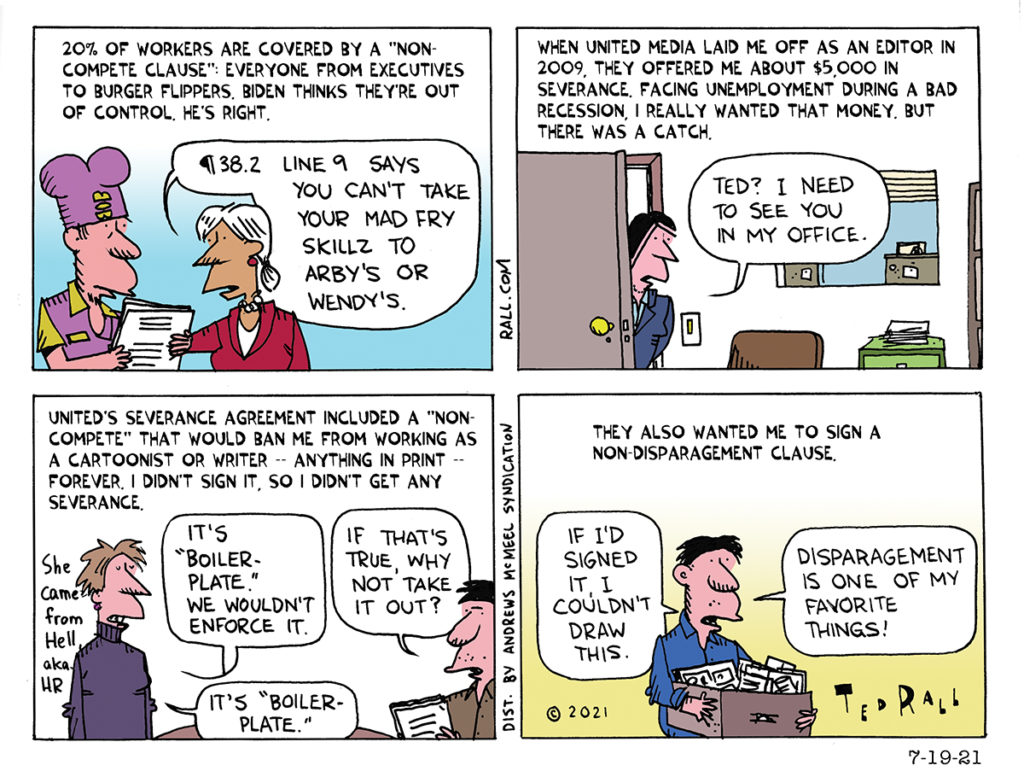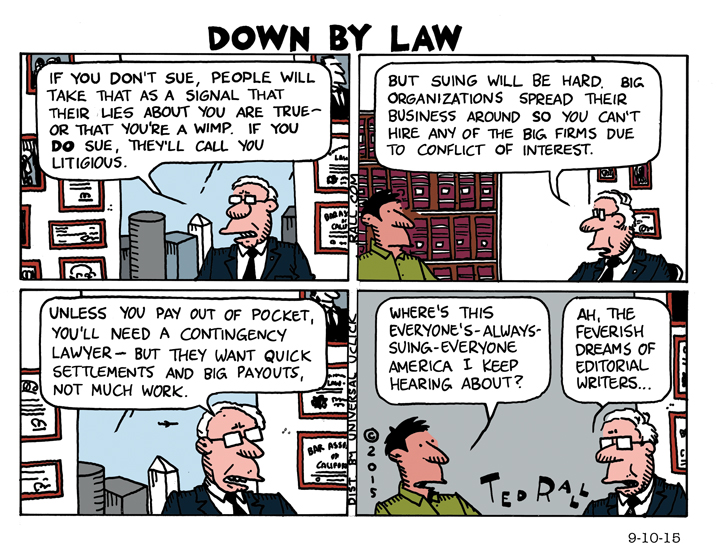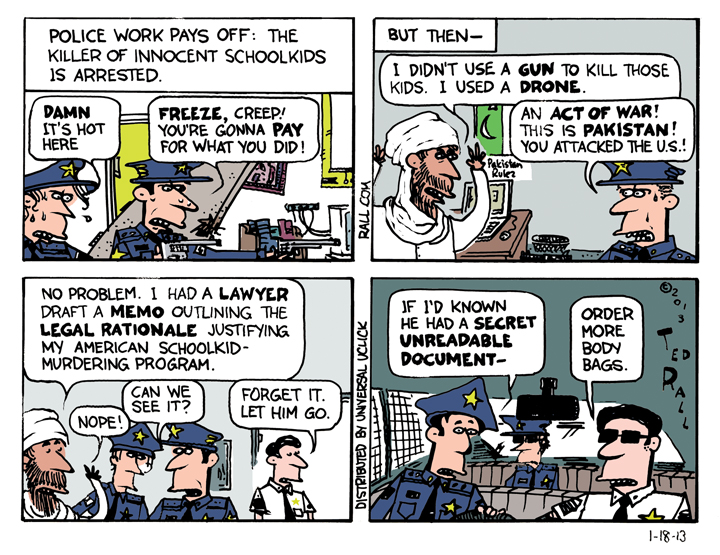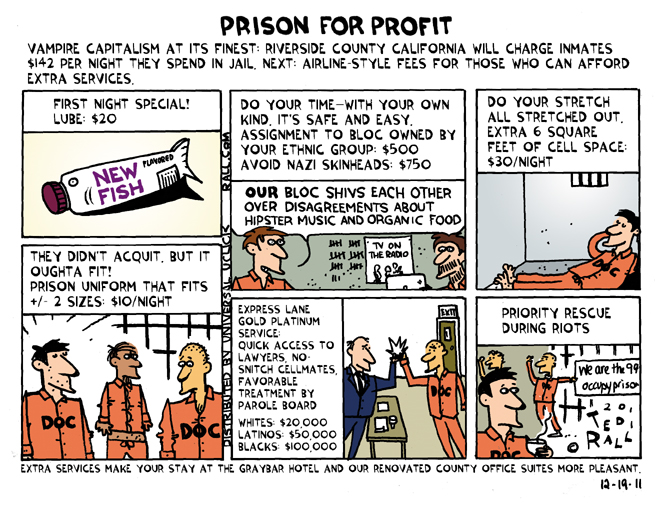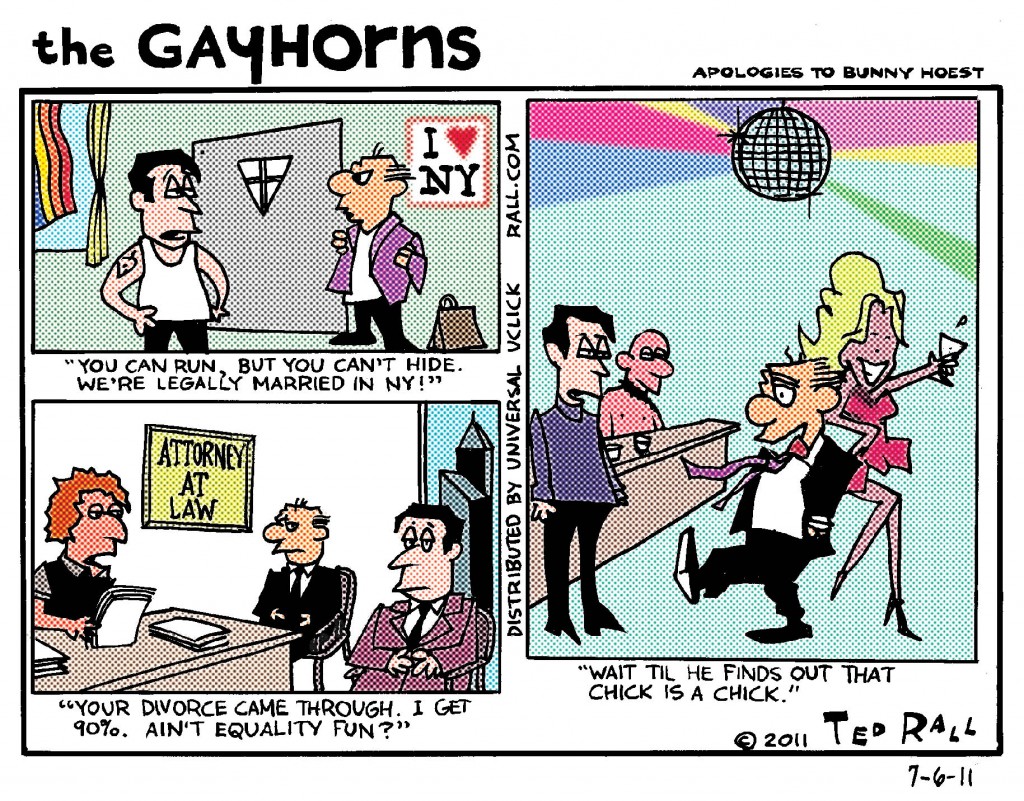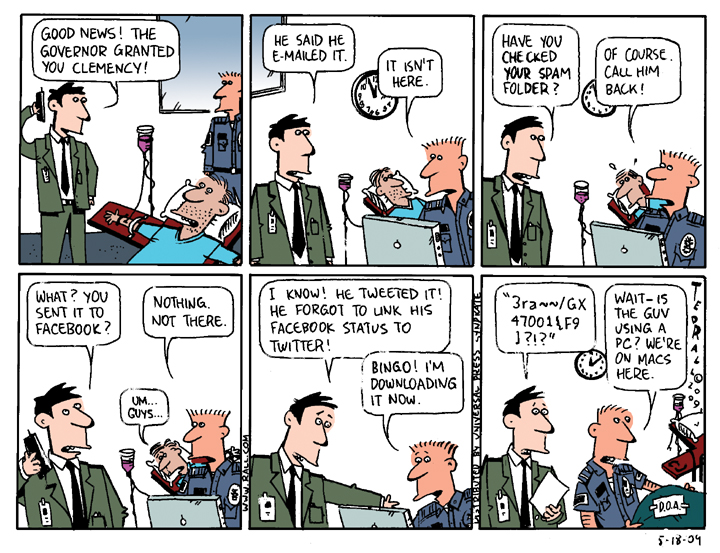A New York judge ruled that Donald Trump’s company lied about the size and value of his real estate holdings in order to obtain loans fraudulently.
SYNDICATED COLUMN: How I Found Out That the Courts Are Off-Limits to the 99%
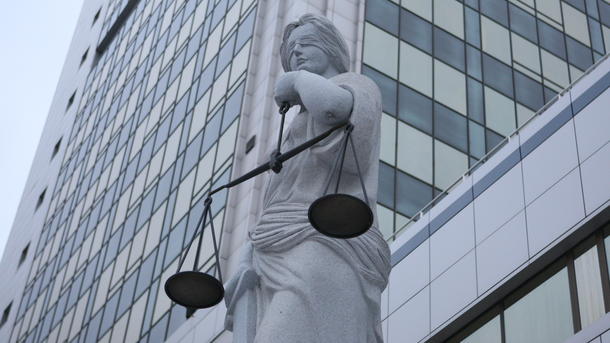 I’m suing the Los Angeles Times. I’m the plaintiff. I’m the one who was wronged. The Times should be defending themselves from my accusations that they fired and libeled me as a favor to a police chief.
I’m suing the Los Angeles Times. I’m the plaintiff. I’m the one who was wronged. The Times should be defending themselves from my accusations that they fired and libeled me as a favor to a police chief.
But this is America.
Deep-pocketed defendants like the Times — owned by a corporation with the weird name Tronc and a market capitalization in excess of $400 million — are taking advantage of America’s collapsing court system to turn justice on its head. In worn-out Trump-era America, the corruption and confusion that used to be associated with the developing world has been normalized.
If you’re a big business like Tronc, you may be the defendant on paper but you have all the advantages in court. Your money allows you to put the plaintiff on the defense. You’re equal in the eyes of the law — theoretically. But it doesn’t feel like justice when the victim has to defend himself from the criminal. It’s like that song “Lola,” in which the Kinks sang “girls will be boys and boys will be girls”; the courts system is a mixed up, muddled up, shook up world.
States like California passed anti-SLAPP laws to defend individuals with modest incomes (like me) against deep-pocketed plaintiffs (like the Times) that file frivolous lawsuits to intimidate and harass their critics. After an anti-SLAPP motion is filed, the case freezes until a judge decides whether the case is meritorious. If the judge says it’s frivolous, it’s dismissed and the poor individual defendant gets his or her attorney’s fees paid by the deep-pocked corporation plaintiff.
After I sued them for defamation and wrongful termination, the Times filed three “anti-SLAPP” motions against me. So if the judge decides I don’t have a good case, this middle-class individual plaintiff will have to pay deep-pocketed defendant Tronc’s legal fees. The Troncies want at least $300,000.
Talk about topsy-turvy! The legislature should fix this law but they won’t because there’s zero political movement in that direction. I may be the only journalist to have criticized anti-SLAPP laws in a public forum. Articles about anti-SLAPP feature nothing but praise.
There were three motions. I lost one on June 21st, against the individual Times employees and executives involved in libeling me. (I plan to appeal.) That loss prompted a parting of ways with my attorneys. What followed was a month of representing myself pro se (in California they call it in pro per).
I now have new lawyers, and we’re waiting to hear how I did arguing against ace lawyer Kelli Sager’s anti-SLAPP motions for the Times and Tronc in LA Superior Court on July 14th. It sucked. But representing myself gave me a full-immersion crash course in just how messed up the courts really are.
The big thing I learned was that poor people have zero access to justice.
Nor do the middle class.
After the June 21st debacle, a semi-retired lawyer friend advised me to file a Motion for Reconsideration, a request to the judge to take another look and perhaps realize that he made some mistakes. The law gives you 10 days to file.
My Motion for Reconsideration was one of numerous motions I would have to draft and file myself while pro se. It was incredibly expensive, wildly burdensome and so daunting I bet 99% of people without a lawyer would throw up their hands and give up.
I’m the 1%.
I’m a writer. I went to an Ivy League school; I was a history major so I’m good at research. I used to work at a bank, where I worked on legal documents so I’m familiar with legalese. So I researched what works and doesn’t work in a Motion for Reconsideration. I crafted an argument. I deployed the proper tone using the right words and phrases.
Most people, not having the necessary skills or educational attainment, wouldn’t stand a prayer of writing a legal brief like this motion. Mine may fail — but the judge might read it and take it seriously because it’s written correctly.
I called the court clerk to ask how to file my motion. She was incredibly curt and mean. I’m a New Yorker so I persisted, but I could imagine other callers being put off and forgetting the whole thing.
Schedule a date for your hearing on the court’s website, the clerk told me. Good luck! The site had an outdated interface, was loaded with arcane bureaucratic jargon and a design that’s byzantine and hard to navigate. If English is your second language, forget it.
Eventually I found the place to reserve a hearing date — where I learned about the $540 filing fee.
Payable only by credit card.
No debit cards.
No Amex.
Protracted litigation against a well-funded adversary like the Times/Tronc could easily require dozens of $540 filing fees. The poor need not apply. Most Americans don’t have that kind of money. And what about people who scrape up the dough but don’t have plastic?
$10 would be too much. $540 is frigging obscene.
I paid the fee, printed out the receipt as required, stapled it to the back of my multiple required copies of the motion and went to the Stanley Mosk Courthouse to file it. As I waited in Room 102 to have my motions stamped by a clerk, I studied the many working-class people waiting in the same line.
Here too, there is no consideration for the people. The clerk’s office is open Monday to Friday 8:30 to 4:30. Most people work during those hours. Gotta file something? You have to take time off. Parking? Expensive and far away.
I have a dream.
I dream of a court system dedicated to equal justice before the law — where anyone can file a motion, where there are no filing fees, where the courthouse is open on weekends, where you can file motions by uploading them online and there’s free parking for citizens conducting business in the people’s house.
But Tronc wouldn’t like that system.
(Ted Rall (Twitter: @tedrall) is author of “Trump: A Graphic Biography,” an examination of the life of the Republican presidential nominee in comics form. You can support Ted’s hard-hitting political cartoons and columns and see his work first by sponsoring his work on Patreon.)
Breaking Modern Essay: How One Speeding Ticket Can Ruin Your Life
This essay originally appeared at BreakingModern.com:
There once was a time during the 1980s when you could find a parking ticket on your windshield, crumple it up and drive off as if it had never existed. Nothing would happen. Usually. It was worth the risk.
But that time is no more.
I am often asked, to my considerable surprise, by seemingly intelligent people — people who don’t eat their own boogers, people who are capable of holding gainful employment — whether they can blow off and get away with a ticket.
My answer? NO! You cannot!
There are three relatively recent reforms in how municipalities handle petty offenses which make ignoring a parking or desk-appearance ticket (more on this later) a Bad Idea. They include rapidly escalating costs (for example, $75 if you pay within 10 days, $120 within 20 days, $200 within 30, and so on). There now are computer-linked “reciprocity” systems between cities and states (if you get a ticket while driving a rental car in California, they’ll know it was you — and you get slammed with a fine and points on your license back home in Texas). And they also include computer-issued arrest warrants if you fail to pay or appear in court.
You won’t even know they’re looking for you until a cop stops you for something else down the road and runs your ID. Then it’s all over. And it gets worse …
Beer, Bench Warrant and Busted!
“A single beer put Patrick Lamson-Hall behind bars for 27 hours,” reported The New York Daily News. “The New York University grad student was slapped with a summons and a court date for drinking a can of Pabst Blue Ribbon on a West Village stoop.”
Turns out the 25-year-old Oregon native forgot about both until a pair of cops stopped him — it was months later — for riding his bike on a Brooklyn sidewalk. Within minutes, Lamson-Hall was placed in handcuffs, tossed into a squad car and taken to the 79th Precinct in Bedford-Stuyvesant. He was busted on a bench warrant over his failure to appear in court.
“I assumed they’d have me pay a ticket for the open container,’ said Lamson-Hall afterward. ‘It didn’t occur to me that I was going to spend the night in jail.’”
Lamson-Hall’s experience is hardly rare. One million New Yorkers — that’s one out of eight city residents — have outstanding warrants for similar “desk-appearance tickets” for offenses like littering or failing to clean their dog’s poo. The vast majority probably have no idea the cops are looking for them.
“Even if you feel that you were in the right, even if you feel that the summons is ridiculous, you need to come to court to resolve it because there are real consequences if you don’t,” says David Bookstaver, a spokesman for New York’s court system. Which brings us to:
The Opposite of Bliss
A parking ticket, a moving violation like a speeding ticket or a desk-appearance ticket for a petty crime (like, soon in New York City, for smoking pot on the street), make sure you make that ticket a top priority in your life.
Ignoring tickets has quite literally ruined countless lives. Some people have even lost their cars and become homeless as a result.
Like in the movie The Terminator, the justice system will not stop, ever, until you pay, show up, or get exonerated.
Put that ticket on your fridge. Read it carefully. Deal with it first thing.
Do You Need to Show Up? Probably, Yeah
There are two kinds of tickets: those that require you to show up in court and those that can be mailed in. Generally, bigger offenses, like driving 20 mph or faster above the speed limit, do require a court appearance. Minor ones, not so much. So read your ticket carefully to see if you need to show up.
If you have a scheduled court date, but can’t make it, you can usually have the date postponed. Call the court or check their website to learn the procedure for requesting a delay, or “continuance.” Living far away isn’t an excuse not to attend. I once had to fly from New York to central Nevada to attend to a speeding violation. This sucked. But it was what it was.
Before we continue with what to do when you get a ticket, however, let’s go back to something you should know before you get one:
Rule Zero: Shut Up! This Cop is Not Your Friend
Citizens and residents of the United States — and tourists, too— have the right not to incriminate themselves. When a cop confronts or pulls you over, he or she is trained to try to get you to incriminate yourself. When a policeman asks: “Do you know how fast you were going?” or “Do you know why I pulled you over?” he or she wants you to admit you were speeding or whatever.
The authorities will use your casual comments and answers in court if you decide to challenge your ticket.
So say nothing. The truth is, you don’t even know why you were stopped. How could you? You don’t know how fast you were going. Speedometers aren’t precise; you can’t read the officer’s mind. Shut up. Use non-committal answers, like “I see.” If asked how fast you think you were going, feel free to claim you were going the legal limit. It’s not even illegal to lie to a cop in this situation and it sure can’t hurt.
Be polite. Keep your interior lights on and your hands on the wheel to avoid freaking out the officer. There’s no point arguing. If the cop asks you whether he or she may “just take a look” inside your vehicle, your answer should always, always be no.
Even if your car is clean, there is no advantage — none, nada — to cooperating.
Be nice. Sometimes that makes all the difference.
Okay, as you were:
Should You Just Pay the Fine?
It’s tempting to send in your check and be done with it. Assuming you pay on time, the court will be satisfied. Regardless, if you decide to do this, be careful. I once got arrested on a desk warrant after Long Island Expressway police failed to credit me for payment for a speeding violation. Now I carry copies of my canceled checks in the glove compartment along with my auto registration! Live and learn.
Parking tickets should be paid promptly in order to avoid escalating fines or even nastier sanctions such as getting your car towed away or clamped by “the Denver boot.” Parking fines are typically relatively low, so it may not be worth it to take time off from your job or to hire a lawyer to try to get them reduced or thrown out.
What if You Really Are Innocent?
Well, that’s an exception. It happens. I got a parking ticket once in Washington, D.C. Neither I nor my car were even there at the time, however. I appealed by mail, presenting proof I was in New York that day and that the model of car wasn’t mine. (The traffic agent probably miswrote the license plate number.) But whatever. I won.
Why You Going to Court is Your Best Chance of Getting Off
If you’ve got several previous tickets and the time to spare, you can get real money knocked off by dressing decently and spending an hour or two in court. I recently got tickets totaling $240 for parking down to $100 just by showing up and explaining that I was confused by new parking regulations.
If you can afford it, moving violations should always be challenged in court, ideally by hiring a lawyer who specializes in traffic tickets in the relevant municipality. Mail appeals tend to be less successful. That’s because the days of getting a speeding ticket, paying it off and forgetting about it are long gone.
Worse, most states now have quietly passed draconian penalties for moving violations i.e. New York State’s “Driver Responsibility Assessment Law.” What this means is that you don’t just pay the fine listed on the ticket. Instead, you pay hundreds of dollars more, even if your license is from another state!
In Virginia, perhaps the most notorious state for this in the Union, speeding is often charged as “reckless driving,” punishable by a year in prison and a $2,500 fine, not to mention a criminal record that’ll follow you mercilessly for the rest of your miserable life.
And then the extra bill arrives in the mail, often months after you plead guilty.
It Doesn’t Take Much to Get Your License Suspended. Get a Lawyer
These days, it doesn’t take much to get your license suspended. In New York, for example, a speeding violation of 20 mph or higher over the limit — say, 76 in a 55 — gets you six points on your license. If you get a second six-point violation within 18 months, they take away your driving privileges. And some auto insurers will jack up your premiums to reflect your need for speed.
In the long run, a lawyer will be cheaper than trusting your fate to the tender mercies of the judiciary.
Most lawyers will charge you less to represent you than you’d pay in fines in the aggregate. You won’t have to show up in court, which means saved personal days.
How can a lawyer help you after you’ve been nabbed with a ticket for something you actually are guilty of? Easy. Lawyers use several tricks to reduce your exposure. They may negotiate your ticket down to a minor offense, like a parking violation, that carries a lesser fine and/or no points. They might schedule your court hearing for a time when your police officer is on vacation, ensuring your case gets thrown out. (That trick, a relic from the old days, still works. Waiting for the cop to not appear in court.)
Or they repeatedly plead for a continuance until the 18-month period when you’re just one ticket away from suspension passes (the clock starts ticking on the day of the alleged offense).
Can’t Afford a Lawyer? How to Act Like One …
If you can’t afford a lawyer — I advise you to beg, steal or borrow to pay one, but anyway — use the lawyerly trick of delaying your court date as long as possible. After your delays run out, show up in court yourself; some judges will reward your deference.
Ask if you can take traffic school to get your points eliminated.
And for God’s sake, drive cautiously. Don’t get another ticket until the passage of 18 months erases the points on your driving record.
Similarly, a desk-appearance ticket is a serious matter. If you’re found guilty, you could wind up with a misdemeanor — yes, a real criminal record! Again, if you have the money, hire a lawyer to work his or her magic. If you’re broke, show up. If you lose, pay right away.
What Happens if You Don’t Pay?
This is not an option. Stop thinking like that! You are going to pay. The only question is when — now or later — and how much — a little or a lot.
Pay later, and you will pay a lot.
This is NOT one of those happy aspects of life that rewards procrastination.
If your failure to appear in court results in your arrest, you could be in for a singularly unpleasant experience, one that could even cost you your job or your life. A former roommate of mine got busted buying a small quantity of pot from an undercover narcotics agent in lower Manhattan. It was noon; he was at lunch. When he wasn’t back at his desk at 1 p.m., his boss was worried. When he didn’t show up for three days (long waits to be processed through the system aren’t rare, especially when there’s a holiday), he became angry — and he fired him.
Then there’s the public beer/bike on the sidewalk guy I mentioned up top. He spent a night in jail — one night in a solitary jail cell with no windows, no water and a broken toilet. Cops refused to let him make a phone call before vanishing for hours.
You Probably Won’t Get Beaten Up in Lock-Up, But …
Yeah. I know. The Constitution is there to protect you. But in the real world, the Constitution often ends the second handcuffs hit your wrists. You’re probably not going to get raped or beaten in the lock-up, but if you need your meds to stay healthy — an asthma inhaler, say — you’re in deep doo doo if they throw you in jail. Standard procedure is to confiscate your drugs and ignore you when you complain.
This can kill people. Not that all authorities care. It’s procedure, like I said.
Even if the state doesn’t get all medieval on you, fines for non-payment are going to pile up exponentially. And thanks to sophisticated license-plate scanning machines that collect hundreds of millions of images per year for collection into a national database out of George Orwell’s worst nightmares, it’s only a matter of time before you get stopped and arrested … or have your car confiscated.
It ain’t fair. It ain’t right. But when you get a ticket, the last thing you want to do is ignore it.
More Body Bags
After a bunch of school children are killed, American police track the killer to Pakistan. There they run into some legal problems: not only did the killer use a drone instead of an assault rifle, he had a full-fledged legal opinion drafted by a full-fledged Pakistani lawyer justifying his drone program. And he won’t let the cops read the thing. Oh well, nothing to do.
SYNDICATED COLUMN: Barack Obama, Torture Enabler
Spain Enforces America’s Laws
America is a nation of laws–laws enforced by Spain.
John Yoo, Jay Bybee, David Addington, Alberto Gonzales, William Haynes and Douglas Feith wrote, authorized and promulgated the Justice Department “torture memos” that the Bush Administration used for legal cover. After World War II, German lawyers for the Ministry of Justice went to prison for similar actions.
We’ve known about Yoo et al.’s crimes for years. Yet–unlike their victims–they’re free as birds, fluttering around, writing op/ed columns…and teaching. At law school!
Obama has failed to match changes of tone with changes in substance on the issue of Bush’s war crimes. “We need to look forward as opposed to looking backwards,” he answered when asked whether he would investigate America’s worst human rights abuses since World War II. Indeed, there’s no evidence that Obama’s Justice Department plans to lift a finger to hold Bush or his henchmen accountable.
“They should arrest Obama for trying to impersonate a President,” one wag commented on The San Francisco Chronicle‘s website.
Fortunately for those who care about U.S. law, there are Spanish prosecutors willing to do their job. Baltasar Garzón, the crusading prosecutor who went after General Augusto Pinochet in the ’90s, will likely subpoena the Dirty Half Dozen within the next few weeks. “It would have been impossible to structure a legal framework that supported what happened [in Guantánamo]” without Gonzales and his pals,” argues the criminal complaint filed in Madrid.
When the six miscreants ignore their court dates (as they surely will), Spain will issue international arrest warrants enforceable in the 25 countries that are party to European extradition treaties. All hail King Juan Carlos I!
Which brings us to a leaked report by the Red Cross, famous for its traditional reticence to confront governments. Which means that physicians are enjoined to do no harm. Doctors are prohibited by their ethical code of conduct from attending, much less participating in, torture. (What does this have to do with Bush’s lawyers? Hold on. I’m getting there.)
The Red Cross found that CIA doctors, nurses and/or paramedics “monitored prisoners undergoing waterboarding, apparently to make sure they did not drown. Medical workers were also present when guards confined prisoners in small boxes, shackled their arms to the ceiling, kept them in frigid cells and slammed them repeatedly into walls,” reports The New York Times.
“Even if the medical worker’s intentions had been to prevent death or permanent injury,” the report said, they would have violated medical ethics. But they weren’t there to protect anyone but the CIA. They even “condoned and participated in ill treatment….[giving] instructions to interrogators to continue, to adjust or to stop particular methods.” Charming.
Since 1945, at least 70 doctors around the world have been prosecuted for participating in torture. But not Bush’s CIA torture facilitators. Not by this president. Asked to comment on the Red Cross report, a spokesman for CIA director Leon Panetta replied that Panetta “has stated repeatedly that no one who took actions based on legal guidance from the Department of Justice at the time should be investigated, let alone punished.” (There’s the lawyer connection.)
Which is similar to what Obama said about the torturers: “At the CIA, you’ve got extraordinarily talented people who are working very hard to keep Americans safe. I don’t want them to suddenly feel like they’ve got to spend all their time looking over their shoulders and lawyering up.” Don’t you just hate being micromanaged when you’re torturing people?
Ah, the great shell game of American justice. You can’t prosecute the torturers because their lawyers advised them that torture was OK. You can’t prosecute the lawyers because all they did was theorize–they didn’t torture anyone. You can’t prosecute the president and vice president who ordered the torture because they have “executive privilege” and, anyway, who would put a head of state on trial? What is this, Peru?
What’s the flip side of a victimless crime? A perpless crime?
It’s a neat circle, or would be if it fit, but drink some coffee and let the caffeine do its thing and it soon becomes apparent that it doesn’t come close. The trouble for the Bushies, and now for Obama–they’re his torturers now–is that lawyers are bound by a higher code than following orders.
Yoo, Bybee, Addington, Gonzales, Haynes and Feith were asked by the White House to come up with legal cover for what they knew or ought to have known were illegal acts under U.S. law, international law, and treaties including the Geneva Conventions (which were ratified by the U.S. and therefore hold the force of U.S. law). Since they don’t deny what they did–indeed, they continue to justify it–their presumed defense if they wound up on trial in Europe would be that they were just following orders.
However, the decision in the 1948 trials of German attorneys immortalized in the fictionalized film “Judgment at Nuremberg” makes clear that a lawyer’s duty is to the law–not his government. And not just his own country’s law–international law.
The Nuremberg tribunal acknowledged that Nazi Germany was an absolute dictatorship in which everyone answered to Adolf Hitler and could be shot for disobeying.
Nevertheless, the court ruled, “there were [German] restrictions for Hitler under international law.” Despite his total legal authority within Germany, Hitler “could issue orders [that violated] international law.” Obeying a direct order from Hitler, in other words, was illegal if it violated international law. And German lawyers went to prison for doing just that.
The six lawyers about to face charges in Spain didn’t have to worry about Nazi firing squads. They were rank opportunists trying to advance their careers in an Administration that viewed laws as quaint, inconvenient obstacles. Here’s how not scared they are: Feith recently penned an op/ed in The Wall Street Journal daring–double-daring–Obama’s Justice Department to go after him.
“If President Barack Obama and the prosecutors see a crime to be prosecuted, they can act,” Feith wrote.
One can only hope. In the meantime, we’ll always have Spain.
COPYRIGHT 2009 TED RALL

